Investment
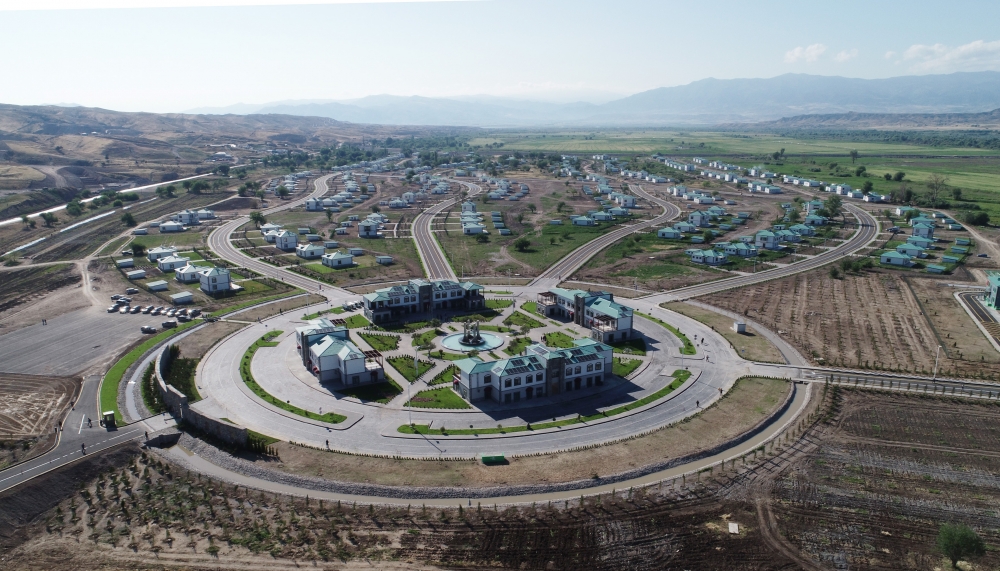
Karabakh: A Land of New Possibilities
The Karabakh region is located in the mid-western part of Azerbaijan and has historically been a conflict zone with Armenia. In 2020, Azerbaijan regained control of the region following a victorious war against Armenia. The reconstruction of the Karabakh region is a top priority project for the Azerbaijani government. In July 2021, an economic zone reorganization was implemented by presidential decree, and the Karabakh Revival Fund was established. Infrastructure projects are rapidly progressing to connect the Karabakh region with the rest of Azerbaijan by land and air, with the goal of developing it into a smart city based on green energy.
Fields such as smart villages, smart grids, and smart farms are considered more accessible for our companies compared to general infrastructure construction. In June 2022, the Ministry of Land, Infrastructure, and Transport selected the Jangilan region (near Karabakh) in Azerbaijan for the K-City Network project. This initiative supports the development of smart cities abroad and expands international cooperation. The Karabakh region’s smart city project is the first phase, and the Azerbaijani government also plans to promote the smartification of major cities like Baku.
Karabakh Investment Projects
※ Companies or individuals interested in investing in Azerbaijan should contact us through the [Inquiry] page.
South Korea and Azerbaijan
: Economic Partners in Growth
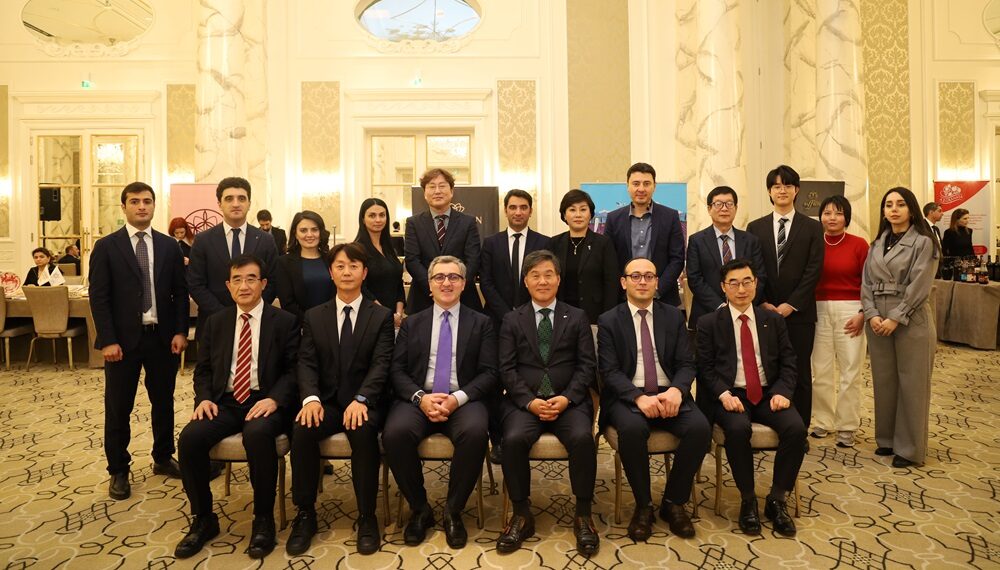
- 1992: Establishment of diplomatic relations between South Korea and Azerbaijan
- 2006: State visit by the presidents of both countries
- 2006: Agreement on air transport liberalization
- 2007: Opening of the Azerbaijani Embassy in South Korea
- 2019: MOU signed between Korea Importers Association and Azerbaijan Export and Investment Promotion Foundation
- March 2024: Korean import delegation visits Azerbaijan
Since establishing diplomatic relations in 1992, South Korea and Azerbaijan have progressively enhanced economic exchanges, especially from the mid-2000s. The ‘Air Transport Liberalization Agreement’ signed in 2006 was the first of its kind with a Central Asian country, marking a significant milestone in the region’s exchanges with South Korea.
Despite recognizing the potential as business partners, the economic exchanges weakened during the 2000s due to the global decline in oil prices. However, the trade volume remains relatively small. In 2019, Korea Trade-Investment Promotion Agency (KOTRA) signed an MOU with the Azerbaijan Export and Investment Promotion Foundation, revitalizing economic exchanges. In March 2024, a Korean import delegation visited Azerbaijan, attended by key figures such as Kim Byeong-gwan, President of the Korea Importers Association, the Korean Ambassador to Azerbaijan, and the Chairman of the Azerbaijan Export and Investment Promotion Foundation, along with representatives from over 50 companies from both countries.
Following the visit of the import delegation, in April, the Korea Importers Association (KOIMA) hosted an Azerbaijan Excellent Companies Presentation and Networking Event. The event was attended by the President of KOIMA, the Ambassador of Azerbaijan to South Korea, and representatives from over 30 import companies. They introduced market trends and major companies in Azerbaijan and provided an opportunity for free networking. Key products highlighted included wine, nuts, and olives, and strategies for investment in Azerbaijan were discussed. The Ambassador of Azerbaijan emphasized that the agricultural sector in Azerbaijan is open to foreign investment, and investors can receive the same incentives as domestic companies. He expressed hope that Korean companies would show great interest, as Azerbaijan is fostering exports in high-potential sectors such as agriculture and manufacturing.
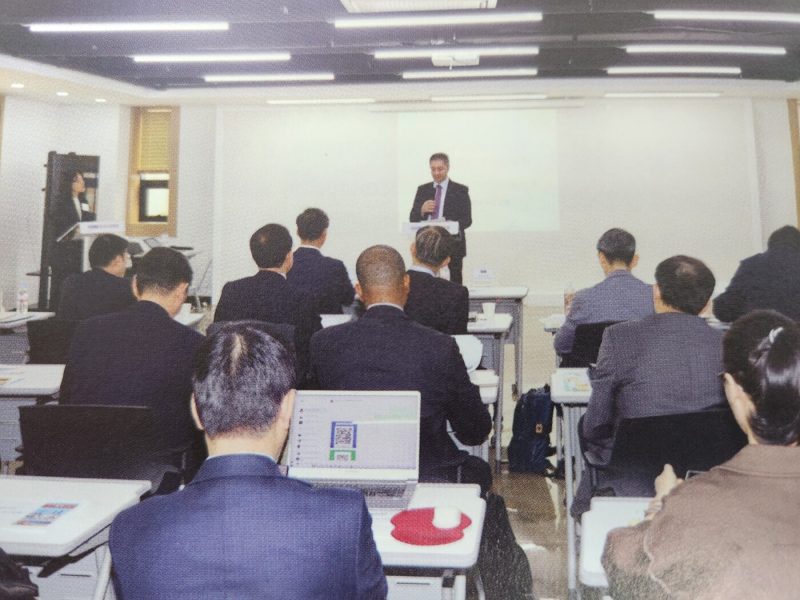
In July 2024, the Azerbaijan Export and Investment Promotion Agency (AZPROMO), the Embassy of Azerbaijan, and Azerbaijani companies participated in the Korea Import Fair, hosted by the Korea Importers Association. They operated investment seminars and promotional booths to showcase Azerbaijan’s economic potential.
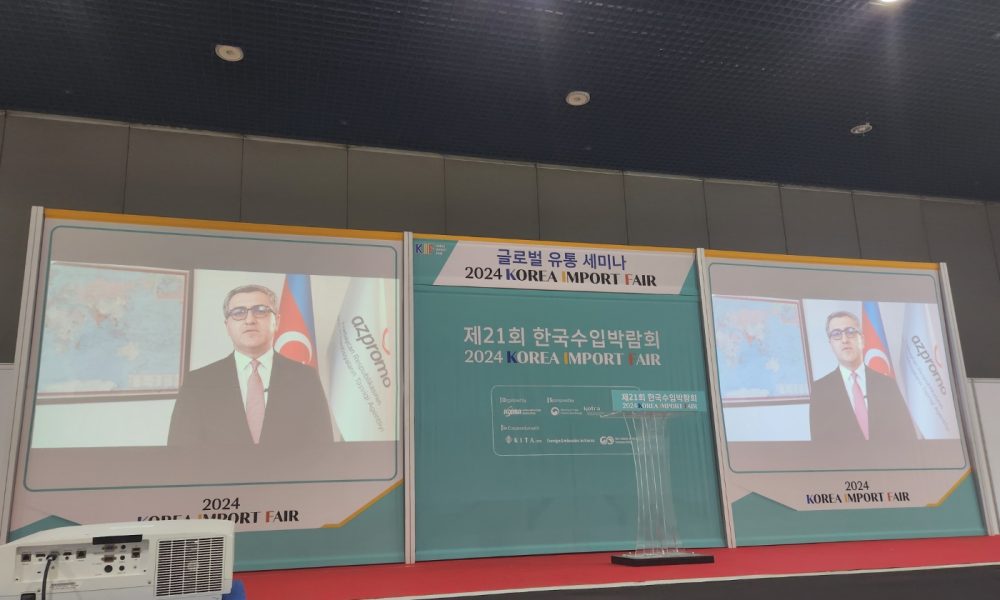
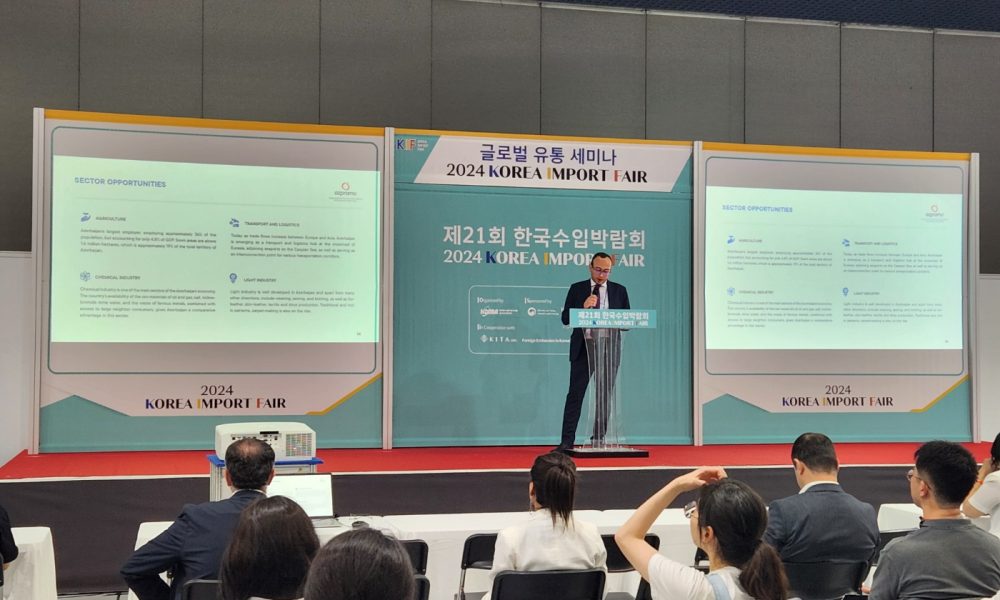
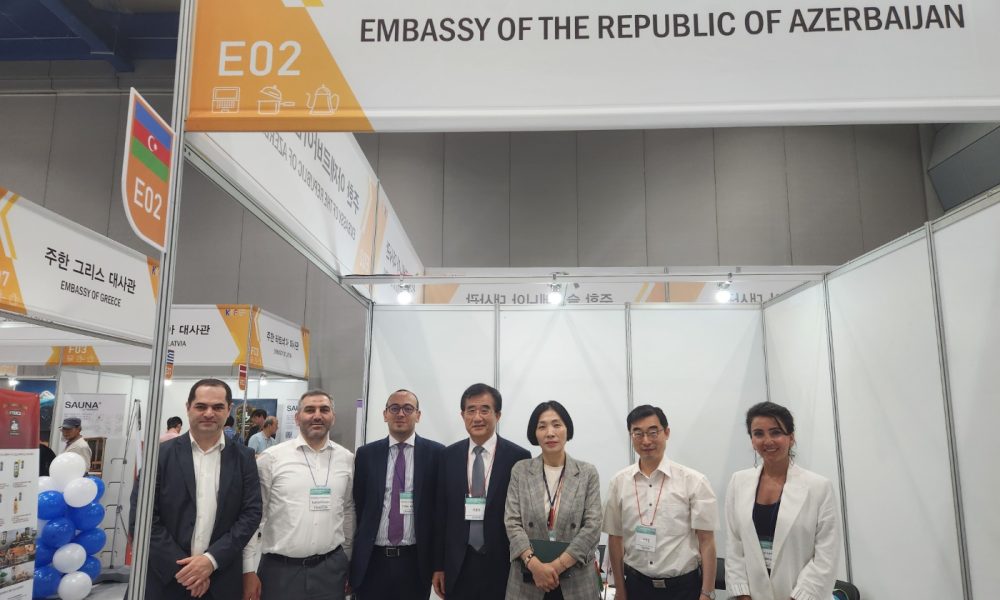
Economic Potential and Business Opportunities in Azerbaijan
Ramin Hasanov, Ambassador of Azerbaijan to South Korea
※ This content is a column published in the Summer 2024 issue of the Korea Importers Association.
Economic Development Strategy of Azerbaijan
Azerbaijan is successfully implementing ‘Azerbaijan 2030: National Priorities for Socio-Economic Development.’ These national priorities for socio-economic development include a continuously growing competitive economy, a dynamic and inclusive society based on social justice, modern innovation and competitive human capital, a great return to the territories liberated from Armenian occupation, and a clean environment and green growth country.
Azerbaijan’s ultimate strategic goal is to transition from a traditional economic system to a more competitive, sustainable, resilient, and innovative economy based on technology, intellectual property, and knowledge.
Azerbaijan is accelerating economic diversification, focusing on information and communication technology, the chemical industry, light industry, transport and logistics, agriculture, food processing, renewable energy, and tourism. Additionally, various support mechanisms are being implemented to realize the untapped growth potential of the non-energy sector. These include promoting production and export, trade liberalization and facilitation, improving export structure, simplifying customs procedures, promoting export-led growth, enhancing the Azerbaijan brand, and encouraging investment in Azerbaijan.
The top priority in the national development agenda, along with achieving the country’s strategic goals, is to implement economic reforms to further promote foreign trade and improve the business and investment environment. Efforts to improve the business environment to attract more foreign investment are ongoing.
Potential investment sectors include chemicals, metallurgy and energy industries, mechanical engineering and building materials production, food and light industry, material and technological base of the agricultural sector, plant cultivation, animal husbandry, information and communication technology, and tourism.
Large-scale recovery and reconstruction work is also underway in the territories returned to Azerbaijan. Using smart and intelligent systems, Azerbaijan is building entirely new cities based on green technology and modern urban planning. It also aims to create green energy zones in the returned territories to achieve carbon neutrality. Therefore, this region, with its immense economic potential, will offer numerous project opportunities and investment possibilities for foreign companies and investors.
Competitiveness of Azerbaijan’s Non-Energy Sector
The impressive development of the energy sector has had positive spillover effects on the non-energy sectors, such as renewable energy, transport-logistics, information and communication technology, and agriculture. Azerbaijan is a blessed country with extensive potential in the renewable energy sector, and building a sustainable energy system is one of its economic priorities. Revenues generated from the energy sector are being invested in various economic sectors, particularly in developing renewable energy. Solar, wind, hydro, biomass, and geothermal energy are promising areas, positioning Azerbaijan as a leader in the renewable energy sector.
Azerbaijan is located at the crossroads of strategic international transport corridors across Eurasia, possessing a favorable geo-economic location and excellent transport potential, making it a significant transportation hub. Azerbaijan actively participates in the East-West, North-South, and North-West international transport corridors. The Trans-Caspian East-West Middle Corridor, which connects Europe, Central Asia, and China through the Caucasus and the Caspian Sea, is emerging as an economically efficient alternative route.
Azerbaijan aims to enhance connectivity to boost inter-regional and intra-regional cooperation. The Baku-Tbilisi-Kars railway occupies a strategically important position in the region, offering competitive connectivity that can increase multimodal transport across Eurasia and logistics flows from Asia to Europe and vice versa. The Baku-Tbilisi-Kars railway, providing the shortest route linking Asia and Europe, transports a large volume of cargo annually.
Azerbaijan is also investing in the Alat Free Economic Zone. The Alat Free Economic Zone offers various advantages to investors, making it a special opportunity for foreign companies and investors looking to collaborate with Azerbaijan.
The Baku International Sea Trade Port, located at the intersection of major international transport corridors, plays a crucial role as a multimodal transport and logistics hub. Particularly, investment opportunities in the port’s fertilizer and grain terminals are promising. The Azerbaijan Caspian Shipping company, a leading player in the Caspian Sea region, provides high-quality international freight transportation services and performs various specialized maritime support activities and upgrade and renovation services.
Silk Way West Airlines, the leading cargo airline in the Caspian Sea and Central Asia region, operates regular flights to South Korea and plans to launch direct passenger flights in the coming years.
Baku Shipyard is an integrated shipbuilding, ship repair, conversion, and engineering services provider for the marine and offshore industries around the Caspian Sea. Baku Shipyard is solidifying its position as one of the leading shipyards in the Caspian Sea region.
As part of the Digital Silk Road mega-project, the Trans-Caspian Fiber Optic Submarine Data Transmission Cable project is underway, forming a digital communication corridor between Europe and Asia, building broadband connectivity, and promoting the development of secure ICT infrastructure and e-commerce across Eurasia. This project will connect Azerbaijan and Asia directly to Europe’s internet hubs, further promoting digital innovation in the region. This bold initiative will offer various business opportunities for foreign companies and investors.
Azerbaijan focuses on expanding technology, innovation, intellectual property, and AI-based investments in free economic zones and economic clusters. Azerbaijan’s industrial, technological, and agricultural complexes are highly suitable for investment and offer diverse and favorable business incentives.
Azerbaijan also prioritizes environmental security, sustainable energy, and green development. One of Azerbaijan’s long-term strategic goals is to transition from a fossil fuel-based economy to a green economy. In this context, clean environment and green growth are set as top priorities in ‘Azerbaijan 2030: National Priorities for Socio-Economic Development.’ Furthermore, by presidential decree, 2024 has been declared the Year of Green Growth in Azerbaijan. COP29 is scheduled to be held in Baku, Azerbaijan, in November 2024, and preparations for this significant global event are actively underway.
Korea-Azerbaijan Economic Trade Cooperation
Azerbaijan and South Korea are forming multidimensional and dynamic cooperation and partnerships. The high-level relations between Azerbaijan and South Korea are very active in the South Caucasus region, and the two countries are fundamentally based on multifaceted cooperation in terms of direction, mechanism, scope, and content. In addition to the Embassy of South Korea in Azerbaijan, the Korea International Cooperation Agency (KOICA) and the Korea Trade-Investment Promotion Agency (KOTRA) offices are operating in Azerbaijan.
Economic trade relations between South Korea and Azerbaijan are the most dynamically cooperating fields between the two countries. Azerbaijan is the most important economic trade partner of South Korea in the South Caucasus region. In 2023, the trade volume between Azerbaijan and South Korea amounted to about $500 million. Key export items from Azerbaijan to South Korea in 2023 included jet fuel, plants used in perfumes and pharmaceuticals, fruit juices, and cosmetics. Last year, Azerbaijan imported vehicles, equipment, machinery, plastics, perfumes, and cosmetics from South Korea. The total amount of mutual investment is about $500 million. More than 80 South Korean companies have entered Azerbaijan, mainly demonstrating their excellent capabilities in construction, trade, industry, and services.
The Economic Cooperation Joint Committee between the governments of Azerbaijan and South Korea is cooperating to promote economic, trade, and investment cooperation between the two countries and foster ‘G2G’, ‘G2B’, and ‘B2B’ fields. The next meeting of the committee is scheduled to be held in Baku, along with a business forum.
Regarding the legal framework for economic cooperation, in 2007, the governments of Azerbaijan and South Korea signed an agreement on the promotion and mutual protection of investments. In 2008, the governments of Azerbaijan and South Korea signed an agreement to avoid double taxation and prevent tax evasion on income and capital.
In particular, economic delegation visits, events, and trade fairs held between the two countries contribute to enhancing economic trade relations. These activities have also opened new horizons for strengthening various trade and partnerships and expanding economic cooperation between Azerbaijan and South Korea.
Azerbaijan also recognizes South Korea as a reliable partner in achieving long-term economic diversification goals in renewable energy, smart agriculture, food processing, chemical industry, information and communication technology, light industry, pharmaceuticals, and intelligent transportation sectors. Moreover, South Korea is a promising market for exporting Azerbaijani agricultural products.
Azerbaijan is emerging as a notable tourist destination for South Korean travelers. In 2023, about 8,000 South Korean tourists visited Azerbaijan. To promote its tourism potential and opportunities and provide B2B consultations, Azerbaijan participated in the Seoul International Tourism Fair in May 2024.
To enhance economic trade cooperation between the two countries, Azerbaijan closely collaborates with various Korean economic organizations, including the Korea Importers Association (KOIMA), Korea International Cooperation Agency (KOICA), Korea Trade-Investment Promotion Agency (KOTRA), Korea Chamber of Commerce and Industry (KCCI), and Busan Economic Promotion Agency (BEPA). These organizations regularly host business delegations and events and participate in various trade fairs.
The cooperation between Azerbaijan and the Korea Importers Association is considered a representative success case. In March 2024, the Korea Importers Association sent a buyer delegation to Azerbaijan. The large delegation from the Korea Importers Association explored Azerbaijan’s economic and agricultural potential and conducted G2B and B2B consultations.
Additionally, in April 2024, the Korea Importers Association held a follow-up meeting with the Azerbaijani delegation. This event was attended by many Korean import companies, providing an opportunity to explore cooperation possibilities.
Azerbaijan also plans to showcase internationally competitive Azerbaijani products and conduct ‘B2B’ consultations at the Korea Import Fair organized by the Korea Importers Association in July 2024.
Korean companies and investors can always benefit from the advantages offered by Azerbaijan’s industrial, technological, and agricultural complexes, the Alat Free Economic Zone, the Baku-Tbilisi-Kars railway connection, the Baku International Sea Trade Port, Silk Way West Airlines, the Digital Silk Road, and the Trans-Caspian East-West Middle Corridor. They can also invest in projects related to the Garabagh and East Zangazur economic regions.
